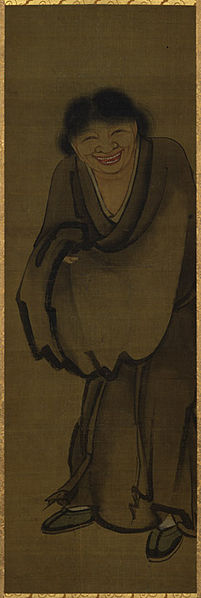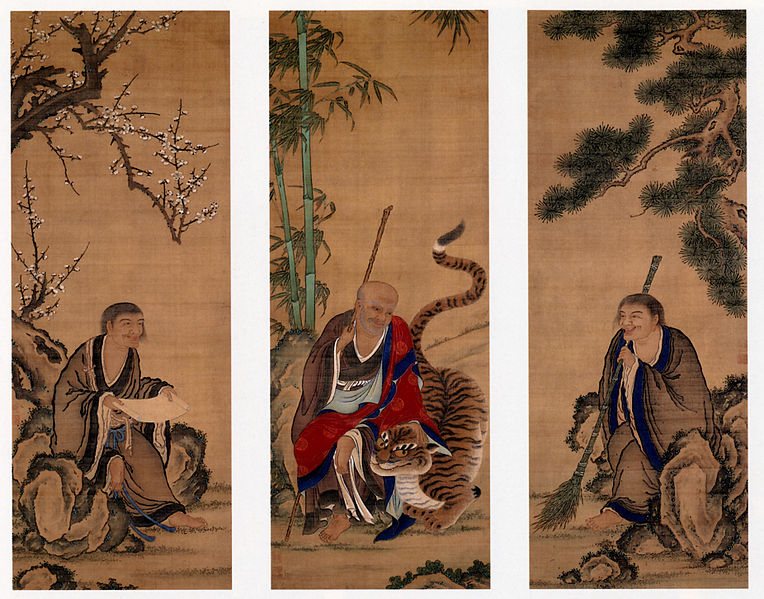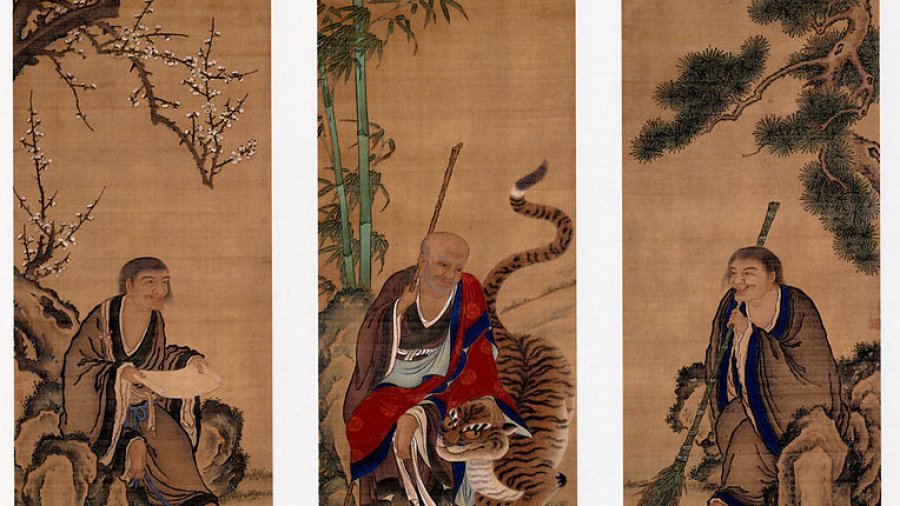“I am soon to become an emperor-ha-ha-ha-ha! I am destined to be a lousy beggar – ha-ha-ha-ha! It’s all a game. Any part will suit me fine.”
For thousands of years, Eastern sages have taught a method for reducing or eliminating suffering — in a word: non-resistance.
The idea is this: As humans, we possess all varieties of expectations and attachments. We attach ourselves to people or circumstances, expecting or hoping that those things will remain the same. We attach ourselves to certain ideas and cling to them tooth-and-nail, even when presented with evidence to the contrary. We attach ourselves to fantasies of a favorable future, and we pray that things will work out according to our plan.

Yan Hui’s painting of Han Shan, a legendary Taoist figure. Via Wiki Commons
Eventually, our attachments and expectations collide violently with reality, and depending on the inflexibility of our attitude, life deals us a proverbial slap in the face. We may experience stress, sadness, anger, frustration, anxiety, etc.
According to the Eastern traditions, one way to quell or even transcend this unnecessary suffering is to resist nothing — remove expectation and attachment, embrace whatever is happening to you, become as a bobber, floating pleasantly and effortlessly upon the ever-changing waves in the ocean of life.
Each of Us Can Learn From This Philosophy
Do I think most people can become the metaphorical bobber? Absolutely not. I think we’re so conditioned to expect our lives to be a certain way that resistance to change is guaranteed for all but a select few. And regardless of one’s ability to embrace change, I imagine some amount of pain will always be inevitable. Perhaps that isn’t entirely a bad thing, though. To experience pain is to be human, and sometimes pain drives us toward positive transformation.
I do, however, think that we can all benefit from these teachings. Even if we are not capable of perfect non-resistance, we can come to understand that preconceived ideas and attachments are truly at the root of much of our suffering. Understanding this, we can actively attempt to reduce expectation, to stop clinging, and to embrace our identities and experiences more fully.
For some time, I have been trying to do this, and lately, I’ve been studying Taoism, one of the great philosophical and religious traditions of the East, to gain more insight. In perusing the Internet for Taoism-related content, I happened upon a particular quote that struck me tremendously.
Blofeld’s Wonderful Passage
The quote captures profoundly the spirit of non-resistance that is taught by Taoism. It is taken from the introduction to The Collected Songs of Cold Mountain, a collection of Taoist poetry by the legendary figure, Hanshan. The introduction from which it is taken, though, was written by John Blofeld, a British writer on Asian thought. Soak it in slowly:
“So ha-ha-ho-ha-ha! Having realized what I really am, I can face all that may come with laughing equanimity, never sure that a change for the so-called worse (including death) will not turn out to be a change for the so-called better. If it does not turn out that way, that’s fine too, for a realized Taoist is too wise to take opposites such as better or worse at all seriously.
I am soon to become an emperor-ha-ha-ha-ha! I am destined to be a lousy beggar – ha-ha-ha-ha! It’s all a game. Any part will suit me fine. You are going to give me a thirty-two course (plus side dishes) Chinese banquet? Thanks, I’ll enjoy that. We have only a bowl or two of inferior-quality boiled rice for dinner? That will go down very nicely. We have nothing on which to dine? Splendid, we shall have more time to sit outside and enjoy the moonlight, with music provided by the wind in the pines.
…Youth passes – so does spring. Old age comes – so do winter’s lovely snowscapes and the kettles bubbling over glowing charcoal. I’m bursting with energy, so I’ll jog or climb Mount Hua. I’m too ill to move, so I’ll enjoy my warm bed and meditate. My wife loves me; “O what joys behind hibiscus curtainsl” My wife has left me; how peaceful it is now. Old Wang has a delicious concubine. I have a charming blue-eyed cat. Reagan is delighted with his new aeroplane. I have fun with my old bamboo raft. I find that I can sleep in only one bedroom at a time and that my old wadded gown sits lighter than fur. While you sit watching pictures on your color TV set, I stand gazing at ripples in a moonlit pond, thanking the gods for not interrupting with commercials. You are a funny creature; so am I- ha-ha! Who isn’t?”

Ueno Jakugen’s 18th century rendering of legendary Taoist figures Hanshan (center), Fenggan (left), and Shide (right). Via Wiki Commons
Playfulness, Humility, Non-Resistance, and Gratitude
In this passage, Blofeld effectively characterizes the playfulness that is inherent in the attitude of the realized Taoist (ha-ha-ha-ha!). A Taoist views life as a sort of game — to be taken lightly — in which we are assigned various roles to play.
In a sense, the Taoist spirit is one of humility. It is a recognition that our individual selves exist within an infinitely vast and complex system. It is an understanding that despite our greatest hopes, we cannot overpower this system; we cannot control many aspects of our lives — the material conditions in which we’re born, when we or our loved ones will die, the state of the world, etc.
Instead of resisting this lack of control, as we all tend to do, the Taoist surrenders to that which is beyond influence. The Taoist chooses to welcome whatever comes into his life and to let go of whatever passes away from it. In other words, he is free from attachment.
Notice too that another crucial aspect of his attitude is to make no definitive conclusions. He is “never sure that a change for the so-called worse (including death) will not turn out to be a change for the so-called better”. The Taoist does not seek to judge his situation as good or bad, but rather, waits patiently, knowing that circumstances change like the seasons — what is “bad” one day becomes “good” the next. In this way, he has effectively removed expectation from the equation.
Equally important, I think, is to note the spirit of gratitude that is present in the passage. Regardless of what may be happening to the narrator, he will cherish the small boons like “a charming blue-eyed cat” or the “ripples in a moonlit pond”. This appreciation for life’s delights, in part, allows him to face it all with “laughing equanimity”.
Simply Remember
As I said above, each of us can learn from these Taoist virtues. In the midst of difficult times (or times when we’re simply rejecting what life brings), we can recall this spirit of playful non-resistance and gratitude.
On my phone, I’m able to set a message to display each morning when my alarm goes off. After reading this quote, I changed my message to: “I am a teacher? Ha-ha-ha-ha!”. I also recently purchased a Buddhist prayer bracelet from a monk on the street in Korea.
These little reminders of Eastern wisdom can serve to orient me toward the mindset that I’m trying to cultivate. I’m an English teacher in South Korea? Spectacular. Let’s have a go at it!
I’d like to reach a point where my default response to life is to affirm it, to say okay to it, to not try to refuse. Remembering and channeling the Taoist approach seems to help me to do that.
Perhaps I’ll tattoo “WWTD” (What Would Taoists Do?) on my palm. Ha-ha-ha! Only joking. You are a strange, silly creature; as am I- ha-ha! Who isn’t?
If you enjoyed this, you may want to look into the ways to receive free updates from Refine The Mind.
About Jordan Bates
Jordan Bates is a Lover of God, healer, mentor of leaders, writer, and music maker. The best way to keep up with his work is to join nearly 7,000 people who read his Substack newsletter.





Refining the mind is very significant in establishing self growth. I look forward to reading more blogs from you in the future. Great article, by the way.
I’m glad you think so, Vishaun. And thank you! Hope to hear from you again. Take care.
Hey, I’ve posted previously (The Alan Watts “What if money was no object”) and have followed your writings for a while – great job!
This is a lovely piece and it comes at a time when I have just concluded self study of the Tao Te Ching, Chuang Tzu and The Way of Zen – I am certainly saving this one!
Thanks again!
“Man suffers because he takes seriously what the Gods made for fun.”
Jack, Feel free to comment as often as you like! 🙂 Always great to know people follow what I’m writing. I appreciate that. I’m glad this post could come at such a great time! I actually also recently read the Tao Te Ching, and I’ve previously read The Way of Zen as well. Great stuff! I’m actually planning to post on the Tao Te Ching in the coming weeks, so look forward to that. Love that last quote by Watts as well. As I once heard an old gentleman on Reddit say, “You and I are breathing the same air.”… Read more »
This post very much speaks to my present situation, as I’ve been thinking about this exact topic for about a week now. One area of this that I struggle with is trying to balance my present happiness with my hope that it will continue. For example, you meet someone you’re excited about possibly dating (or getting an interview for a dream job, etc). You thoroughly enjoy spending time with that person, getting to know them, getting to know yourself better in the process. And that giddiness exists in the present and should be embraced and accepted for what it is.… Read more »
Great to hear that the post is relevant to you, venus. You bring up a really interesting point — the anxieties and doubts that come with feelings of happiness. I know *exactly* what you’re talking about. Whenever I’m feeling great about life, I almost always have a thought in the back of my mind like, ‘Mmmm, this feels too good to be true, and I know it won’t last forever.’ I like your point about reminding ourselves that “better” and “worse” are just labels. Still, we do experience periods of our lives as “good” or “bad”, and so I think… Read more »
@ Venus… “It’s a hard balance to find because those emotions of happiness, hope, and fear are so intertwined. It’s hard to separate them out.” Um. Interesting. You got me thinking there… I don’t think I CAN do that, or even that I particularly try to. I know full well in my own (tiny) mind that what I thought in the past was BAD (disaster-terrible-Oh!-wail, wail!-MOAN…) actually opened other doors, avenues, potential. For the better. I can think of many jobs and relationships I should have/might have/could have…. but didn’t. It’s only in hindsight that you realize that it was… Read more »
“One area of this that I struggle with is trying to balance my present happiness with my hope that it will continue.”
Let it go. Don’t “try” to balance anything. Just be. Your hope that it will continue places no control over your happiness, therefor you should not try to control your happiness.
What is happiness anyhow? Our label for a good feeling?
Trying “to be” happy is hard. Just be. The rest will come as it comes.
Fantastic post. Have you read the Consolations of Philosophy by Alain de Botton? I think you’d like it.
Will, thank you! No, I haven’t, but I just added it to my reading list. Appreciate the recommendation. Cheers.
“I am soon to become an emperor-ha-ha-ha-ha! I am destined to be a lousy beggar – ha-ha-ha-ha! It’s all a game. Any part will suit me fine. – ” You wrote this is a very sensitive, feeling style of writing. I applaud your thinking and research. There are some eminently quotable quotes here! A friend of mine is a Vietnamese pilot, who flew (and crashed) and flew some more (and got shot down) (several times) during the Vietnam War. They pushed his chopper off the aircraft carrier he landed on. (remember that footage?) He spent many years separated from his… Read more »
Really glad you liked this one, Francis. Thanks for relaying a bit of info about a fellow who sounds pretty wonderful. I enjoyed hearing about him, and I appreciated everything else you said. Cheers.
[…] way fewer fucks, do our thing, have compassion, and groove with whatever’s going on. “Embrace what you are and whatever is happening to you” is a pretty apt summation of the practical side of Taoist philosophy. Or, said another […]